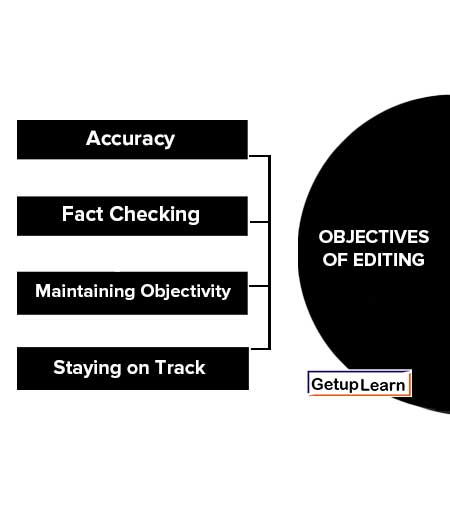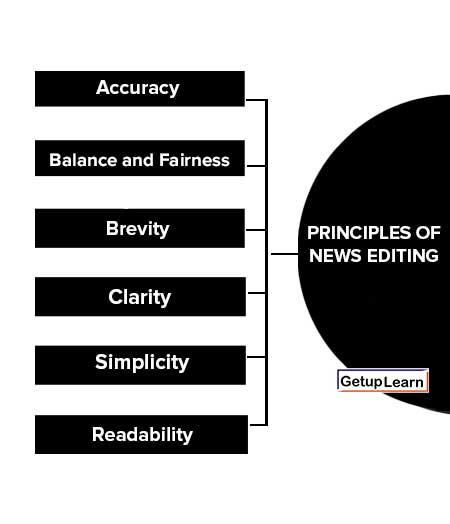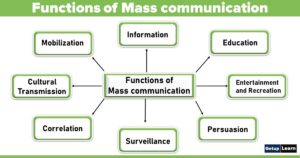Table of Contents
What is News Editing?
In a news organization, news editing plays a vital role. A news story is written by hurried reporters and is rough-edged like a raw diamond. Hence, the copy is polished and honed by a team of editors. Thus, editing is done to achieve a balance of news between that originating within the organization and that pouring in from outside.
Table of Contents
Sorting out and sifting also helps induce parity between the well-written articles and those written by inexperienced reporters. In the process, the unwanted matter gets weeded out. Only the newsworthy stories are finally selected.
These are checked and rechecked for grammar, syntax, facts, figures, and sense and also clarified for betterment, and are condensed for the economy of space.
Objectives of Editing
These are important objectives of editing:

Accuracy
Striving for focus and accuracy: Accuracy is one of the chief corners of the editing stage. News reports have the professional and ethical responsibility to include in their research and writing process the checking of facts, which includes the correct spelling and pronunciation of names, the factual details of a story, and any basis upon which conclusions are drawn.
Multiple checks for accuracy are the norm. All careful, responsible writers should do the same. The reliability of the finished text depends upon accuracy in the research and writing process.
Fact Checking
The internet has increased access to sources for checking facts. Unfortunately, the internet has also increased access to dubious sources.
Debates about the academic credibility and trustworthiness of sources to which the public can contribute will probably continue as expanding internet access changes the rules by which sources are evaluated.
Ready access, speed, and the look of authenticity typically influence public use and acceptance of available resources, as the proliferation of medical, legal, and other specialty websites attest.
One can even watch surgical operations online. Who is to say what is real and what is staged? Most internet users are savvy enough to avoid entering credit card information on unfamiliar and unverified websites.
The “buyers beware” admonition is just as applicable to those who would use the web indiscriminately to find factual information.
Maintaining Objectivity
Inaccurate information can also be dispersed by well-meaning sources. For example, a distraught mother who claims that her incarcerated son is an innocent victim of federal law might have reached that erroneous conclusion as a result of her own emotional investment in her son’s case, as opposed to the facts of the case.
To maintain objectivity, one can report the mother’s perspective as her factual, though the undocumented, point of view, while also reporting the contents of the actual arrest warrant or any other claims communicated by the arresting authority.
Staying on Track
Maintaining the focus of a piece of writing is another important element of the editing stage. Writers are notoriously protective of their work. Crafting a text can be a painful, time-consuming process.
After investing so much time and effort, it is very difficult for some writers to recognize and delete tangential sentences or passages-particularly if they are well-crafted or contain brilliant ideas. Writers can also be blinded to generalizations that do not adequately cover the specifics of a topic.
Principles of News Editing
A good sub-editor always follows these principles while at work:

Accuracy
Accuracy is the mantra a sub-editor always chants. It is achieved by cross-checking everything in the story, from facts and figures to attribution.
Balance and Fairness
Balance can be achieved by keeping objectivity. Objectivity in editing means presenting the story without bias or personal opinion. It is against ‘editorialization’ or reflecting personal views in news writing. It is presenting both sides of the story.
The sub-editor should not write in favor of anyone. Fairness means truthfulness. It is earned by the right observation.
Brevity
Brevity is the soul of journalism. It is telling a story as it should be, without beating about the bush. It saves time and space and wins applause when consummated to perfection.
Clarity
The clarity in expression is achieved by using simple language, choosing the right word for the right context, and simple sentences.
Simplicity
Simplicity and clarity are essentially needed in a news report. While editing, long and complicated words should be replaced by short and clear ones. For simplicity in expression, do away with clutter and jargon. Minute attention should be paid to the words in the story in order to improve their quality and appeal.
Readability
A sub-editor should be vigilant about the mistakes in language for readers. Apt words, expressions, and grammar are very important for developing a good language. Readability is achieved by using readability formulae. Among them, the widely used formula is developed by Rudolf Flesch..
Role of the News Editor
The News Editor is one of the most important persons who plan a daily newspaper. His role in any newspaper office-whether it is weekly or daily-is all-pervading. To a national newspaper an active, intelligent and enterprising news editor is the vital spark that energizes its news coverage and outlook.
paper office. Although most of the news supplied is a mechanical process covered by daily routine, but like all machinery of news gathering, the news editor is responsible for watching its smooth functioning.
The news editor keeps a careful eye on the routine side of his news collection as well as on the other side of his work or the news desk which calls for more imaginative emulation.
Function of the News Editor
An ideal news editor manages to get all the obvious stories into his paper with a good proportion of them as exclusives. While the selection of obvious stories is important, greater importance is attached to the original ones produced by his team of correspondents.
The number of words received on the teleprinter in a newspaper is so large that if each word were to be printed, the newspaper will have to run into hundreds of pages each morning.
The news editor is called upon to use his discretion, discrimination, and imagination in reading the public mind and select the stories which have real news value and can be called important by his readers-quite a large number be allotted a “splash” position on the main news pages according to the subject matter 01 fields of activity they are concerned with.
All this has to be done with alertness to ensure that the kind of stories readers seek shall be found in his newspaper. There are some fundamental stories that no newspaper can afford to miss as they go into all the daily newspapers without exception.
While they are important and have to be included, there are others called exclusive which only an alert news editor can discover from the large ocean of copy that has been pouring into the office during the day.
An intelligent news editor has to make a judicious follow-up of a seemingly promising paragraph or sometimes even make a further inquiry before finalizing the story and give it the perfect shape he wants.
What are the objectives of editing?
The following are the objectives of editing:
1. Accuracy
2. Fact-Checking
3. Maintaining Objectivity
4. Staying on Track.
What are the principles of news editing?
The following are the principles of news editing:
1. Accuracy
2. Balance and Fairness
3. Brevity
4. Clarity
5. Simplicity
6. Readability.












